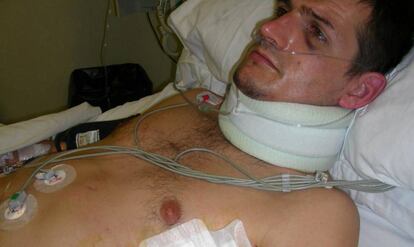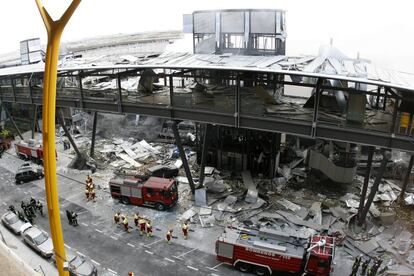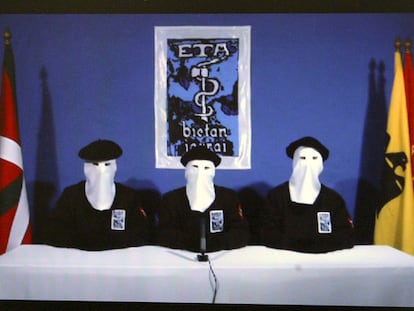Human Rights court rules against Spain in ETA prisoner abuse case
The ECHR in Strasbourg orders compensation paid to men who blew up Madrid airport parking lot, killing two, but falls short of defining incident as ˇ°tortureˇ±


It was a photo that was seen far and wide: a member of the Basque terrorist organization ETA, Igor Portu, laying in a hospital bed with a neck brace on. He was in the ICU with a collapsed lung, two broken ribs, pneumothorax, and bruises all over his body, just hours after having been arrested by the Civil Guard. According to the terrorist, he had been violently tortured on a forest trail along with another member of the group, Mattin Sarasola.
On December 30, 2006, the pair planted a bomb in the Terminal 4 parking lot at MadridˇŻs Barajas airport
Portu and Sarasola were detained on January 6, 2008 in Mondrag¨®n (Guipuzkoa) carrying pistols and ammunition. A year before, on December 30, 2006, they planted a bomb in the Terminal 4 parking lot at MadridˇŻs Barajas airport. The explosion killed two Ecuadorians, Carlos Alonso Palate and Diego Armando Estacio, who were asleep in their vehicles at the time. Portu and Sarasola, whose actions marked the end of a truce that the Basque terrorist group had reached since March of the same year, were later sentenced to 1,040 years in prison.
According to the Civil Guard officers in question, both men had violently resisted arrest and the use of force was necessary to bring them under control. But the provincial High Court in Gipuzkoa sided with the ETA members, and sentenced four civil guards for offenses of torture and bodily harm in December 2010. A year later, SpainˇŻs Supreme Court quashed that ruling, finding that there had been no torture and that the story had been invented by the terrorists.
In a sentence made public today, however, the European Court of Human Rights in Strasbourg has condemned Spain for ˇ°inhuman and degrading treatmentˇ± of Portu and Sarasola, ordering it to pay them compensation of €30,000 and €20,000, respectively, for moral damages. It did not, however, consider the case to have involved torture.
The European Court of Human Rights has condemned Spain for ˇ°inhuman and degrading treatmentˇ±
ˇ°The injuries [ˇ], which have not been denied either by the Supreme Court nor the Spanish government, took place when the complainants were in the hands of the Civil Guard,ˇ± the European Court states. ˇ°Neither the national authorities nor the government have offered any convincing nor credible arguments to explain or justify them. As such, the Court considers that the responsibility for the injuries as described should be apportioned to the State.ˇ±
ˇ°The Court found it sufficiently established that the injuries described in the certificates produced by the applicants,ˇ± the European Court states, ˇ°and the existence of which had not been denied either by the Supreme Court or by the Government, had been caused while they were in the hands of the Guardia Civil. It took the view that neither the domestic authorities nor the Government had provided any convincing or credible arguments which could serve to explain or justify the injuries sustained by the applicants. The Court thus found that the injuries described had to be attributed to the State.ˇ±

But, as the ˇ°applicants had not alleged that the injuries in question had had any consequences for them in the long term, and in the absence of any conclusive evidence about the aim of the treatment,ˇ± the Court considers that the facts should not be qualified as torture. ˇ°That being said, it was sufficiently serious to be regarded as inhuman and degrading treatment.ˇ±
WhatˇŻs more, the European court considers that even were the theory of Supreme Court accepted ¨C i.e. that the injuries were sustained during the arrest ¨C the Spanish tribunal did not consider whether the use of physical force by the civil guards was strictly necessary and proportional, nor whether the more serious injuries suffered by Portu were attributable to the officers responsible for their arrest and supervision. ˇ°Those omissions had prevented the domestic court from establishing the facts and all the circumstances as fully as it should have done, in accordance with its obligation to subject the case before it to the strict scrutiny required by Article 3 of the Convention.ˇ±
The sentence ¨C which was reached by seven judges, among them Spaniard Luis L¨®pez Guerra ¨C concludes that the actions of Spain constitute a violation of Article 3 of the Council of EuropeˇŻs European Convention on Human Rights (prohibition of inhuman or degrading treatment). Three of the magistrates registered a personal vote in which they argued that the facts of the case should indeed be classed as torture.
Two different versions of the same arrest
On the day of the arrests, 15 Civil Guard officers were in the area of Mondrag¨®n (Gipuzkoa), and became suspicious of two men they saw with rucksacks who had just come down the mountainside. The officers decided to ask the men for their ID cards and search their bags. From this moment on, the two versions of what happened next diverge.
The ETA terrorists claim that the arrest took place with no violence, that the officers found the pistols and ammunition in one of the rucksacks, and that they were handcuffed with their hands behind their backs and placed in two Nissan Patrol cars (each one of them accompanied by two officers). They then claim they were taken to a forest trail, where they were insulted, pushed, punched and kicked all over, as well as one of them having their head forced into a river.
That afternoon, while their houses were being searched in Lesaka (Navarre), Portu began to feel very tired and could barely talk. He was taken to a doctor and then urgently hospitalized. He was admitted to the ICU at the Arantzazu Hospital, where he spent three days in intensive care and five in hospital. He took 27 days to recover from his injuries.
For their part, the civil guards claim that they never took the terrorists to a forest trail, and that they violently resisted arrest in Mondrag¨®n, and that physical force was necessary to bring them under control. The injuries, the authorities claimed, were caused by their own resistance, given that they tried to run and had to be brought down. They rejected any kind of physical aggression and put the claims of the ETA members down to the organizationˇŻs strategy of using false torture claims as another way to fight against the Spanish state.
The Civil Guard claimed that the injuries suffered by Portu happened when he fled the scene
The Civil Guard claimed that the injuries suffered by Portu happened when he fled the scene. An officer went after him and tackled him to the ground, before another civil guard fell onto both of them. Once on the ground, the officers claimed, Portu continued to resist arrest, requiring the officers to grab him by the neck, hair and arms. Once both terrorists were in handcuffs, the Civil Guard claims to have driven them in just one car (not two) to the station at Intxaurrondo.
After the case went through the provincial and Supreme courts, Portu and Sarasola tried to take it to the Constitutional Court, but the latter tribunal refused to try it. It was then that they resorted to the European Court of Human Rights, which has ruled in their favor, but did not find evidence of torture, as the pair claim.
Tu suscripci¨®n se est¨˘ usando en otro dispositivo
?Quieres a?adir otro usuario a tu suscripci¨®n?
Si contin¨˛as leyendo en este dispositivo, no se podr¨˘ leer en el otro.
FlechaTu suscripci¨®n se est¨˘ usando en otro dispositivo y solo puedes acceder a EL PA?S desde un dispositivo a la vez.
Si quieres compartir tu cuenta, cambia tu suscripci¨®n a la modalidad Premium, as¨Ş podr¨˘s a?adir otro usuario. Cada uno acceder¨˘ con su propia cuenta de email, lo que os permitir¨˘ personalizar vuestra experiencia en EL PA?S.
?Tienes una suscripci¨®n de empresa? Accede aqu¨Ş para contratar m¨˘s cuentas.
En el caso de no saber qui¨¦n est¨˘ usando tu cuenta, te recomendamos cambiar tu contrase?a aqu¨Ş.
Si decides continuar compartiendo tu cuenta, este mensaje se mostrar¨˘ en tu dispositivo y en el de la otra persona que est¨˘ usando tu cuenta de forma indefinida, afectando a tu experiencia de lectura. Puedes consultar aqu¨Ş los t¨¦rminos y condiciones de la suscripci¨®n digital.










































